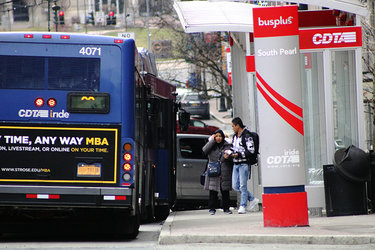As COVID-19 spreads: CDTA scales back service, steps up ‘deep-cleaning’
ALBANY COUNTY — With thousands of employees now working from home and thousands more just out of work, the Capital District Transportation Authority has seen a recent and dramatic drop in ridership as it has ramped up its cleaning and sanitization efforts to combat the coronavirus.
The normal weekday ridership of 60,000 is down between 66 and 75 percent, said Jaime Watson, the CDTA’s director of corporate communications. The good news is that the transit authority’s very public-facing and deemed-essential workforce has yet to have a reported case of the virus, she said.
Parts of 10 different bus routes serve Guilderland, according to Watson, while one route, 719, serves Altamont, Voorheesville, and New Scotland — there is no CDTA service in the Hilltowns. CDTA also offers Flex, essentially a rideshare, which currently serves parts of Guilderland, Watson points out.
The CDTA provides its drivers with gloves, hand sanitizer, and cleaning products for their driver area; it doesn’t provide masks — but that’s partly because it can’t get its hands on any, Watson said. But it has also been following the recommendation from the Centers for Disease Control and Prevention about healthy people not wearing masks, she added.
Watson said that the CDTA, which employs 700 workers, has told its operators that, if they want to wear a mask, they can.
As for how the CDTA is protecting the public, Watson said that each fixed-route bus and Special Transit Available by Request (STAR) service vehicle, which is a service for people with disabilities, gets a “deep-cleaning” every night as the bus comes into the garage.
“It’s a huge undertaking for our maintenance staff,” she said, because it takes anywhere from an hour to an hour-and-a-half to “deep-clean” every bus; the CDTA owns 235 buses — 200 of which are on the road every day. “They are doing a fantastic job with it,” Watson said of the CDTA maintenance staff’s handling of the bus cleaning.
During normal times, CDTA buses would be “deep-cleaned” about once every 14 days; a normal clean involved trash being picked up, seats being wiped down, and the driver’s area being washed. Starting about March 4, the CDTA began “deep-cleaning” its buses every three days; then about 10 days ago, it began with nighty cleanings.
A nightly “deep-cleaning,” in addition to a normal cleaning, includes the seats, handrails, farebox, and operator’s area being wiped down with a hospital-grade sanitizer, and the floor being mopped and sanitized every night as well.
In addition, when buses get to certain layover points during the day, there are maintenance crews at the ready to wipe down the buses. “Our buses are getting cleaned multiple times a day,” Watson said.
Social distancing between passengers has been a challenge, Watson said.
On Monday, March 23, the CDTA implemented some service changes that Watson described as an “enhanced Saturday schedule”; the transit authority is running its Saturday service for many of its routes — meaning fewer runs throughout the day. But, for its “major trunk” routes, the CDTA is running buses at higher frequencies.
Watson said the CDTA found on Monday, March 23, that there was still “decent ridership” on its major routes, which was causing problems with social distancing, so the transit authority added more runs so riders wouldn’t have to get on a bus that already had 10 people on it.
A week later, on March 30, the transit authority instituted a temporary social-distancing policy, requiring passengers to stay six feet from each other as well as the bus driver when possible.
The majority of CDTA ridership comes from its “trunk routes.” The 905 BusPlus Route, for example, which runs between the downtowns of Schenectady and Albany, continues to be popular amid the coronavirus pandemic; this is a route in which the frequency of bus runs was increased because customers began calling with concerns about the number of riders they were encountering, Watson said.
The switch to an “enhanced Saturday” schedule has left some drivers without work so, when those drivers show up for work, CDTA reassigns them to the Albany City School District to help deliver meals to families, Watson said.



